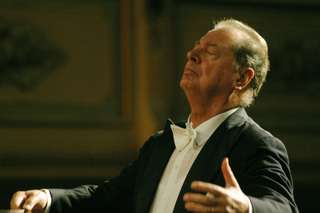|
Back
Playing by the Rules, with Flashes of Brilliance Houston
Jones Hall
04/08/2011 - and April 9, 10, 2011
Wolfgang Amadeus Mozart: Serenada No. 6 in D Major, K. 239, "Serenata notturna" – Flute Concerto No. 2 in D Major, K. 314
Nikolai Rimsky-Korsakov: Scheherazade, Op. 35
Aralee Dorough (flute)
Houston Symphony, Rafael Frühbeck de Burgos (conductor) 
R. Frühbeck de Burgos (© Columbia Artists Management, Inc.)
Spanish conductor Rafael Frühbeck de Burgos led a suave concert mostly notable for the finesse he brought forth from the Houston Symphony. There were flashes of brilliance here and there, mostly coming from the orchestra's principals, but for the most part, this was an innocuous, simply pleasing concert. I suppose one can't demand to be riveted every time one steps into the hall.
What was initially advertised to be Frank Martin's Ballade for flute instead became one of those mediocre Mozart "masterpieces." Amadeus' Oboe Concerto, transposed and rescored for flute, is not his most compelling piece of music. Naturally, it contains some pretty melodies, but through and through it's too polite, lacking any dramatic propulsion or asymmetries that make the composer's greatest works immortal. This is not a jab meant to denigrate the excellent performance of the piece. Aralee Dorough, the HSO's principal flautist, played marvelously. Her sound is unique--large, perfectly focused, and with a transcendent timbre tempered with perfectly judged vibrato. One longed for a more extended cadenza with a bit more pizzazz, but orchestra, soloist and conductor were on their best behavior throughout.
This was preceded by the Serenata notturna, another amiable work. The quartet of principal string players deserves special mention for their elegant phrasing and beauty of tone, matched by the full string complements' responses. The piece, like the concerto, lacks a true, ethereal, Mozartian slow movement, and the outer movements merely fill in traditional Viennese templates with innocent sounds, all done, of course, in the best possible taste. Again, de Burgos' leadership was forthright, and the musicians responded accordingly.
Some may argue that Rimsky-Korsakov's technicolor Scheherazade doesn't contain the structural perfection, melodic inevitability or classical refinement of the indisputable masterpieces of the orchestral repertoire, but I always find it a joy to listen to. De Burgos began with a rigid first movement, Sinbad's ship rocking metronomically on the Arabian Sea. The lack of rubato made it seem as if Toscanini had been channeled to conduct one of the major works he never recorded, making one wonder if the Spanish conductor was going to refuse to satiate the audience's hunger for a fairy-tale performance that wore its heart on its sleeve.
Occassionally, however, it seemed impossible for Frühbeck de Burgos to maintain an emotional distance from the score's enchantments. The opening of the second movement, in particular, brought an imaginatively phrased bassoon incantation of the Kalendar Prince's song, and the ensuing colorful variations, divided by delightfully forceful brass fanfares and brilliantly rendered woodwind and harp cadenzas, were the highlight of the evening. A more cerebral mood returned with the love music of the young prince and princess, but the jaunty middle sections and concertmaster Frank Huang's lithe cadenza before the movement's famous melody made its final return temporarily banished the more obsequious manner of performance that dominated the evening.
The finale verged on the edge of excitement, finally achieving a momentous climax as Sinbad's ship crashed against the cliff. Perhaps de Burgos was attempting a Mahlerian teleology in his interpretation of the work, aiming throughout the four movements towards this one, crushing Höhepunkt and deliberately downplaying some of the other peaks. If so, he retreated back to obeisance in the work's coda which, though again lovingly played, lacked the air of mysterious and nostalgic return that would have made it a more satisfying dénouement.
In all, then, a pleasant concert from the HSO, consistently full of excellent solo contributions from the principals, but lacking a convincing, engaging and memorable interpretive stance from the podium.
Marcus Karl Maroney
|